Ethics in CAM: An International Perspective
- Email This
- Trackbacks
- Share Link
Yet another take on ethical issues in CAM, with an international twist, comes Ernst EE, Cohen MH, Stone J. Ethical problems arising in evidence-based complementary and alternative medicine. J Med Ethics 2004;30: 156-159. In this article, we examine some of the differences between conventional medicine and complementary and alternative medicine, and the implications of those differences for an ethics of CAM.
Our analysis includes training of CAM providers, and safety and efficacy of CAM therapies; research culture for these therapies; notions (or claims) of holism; and ways in which CAM therapies are regulated. Notably, in the U.K., professional self-regulation assumes an important role in setting high standards and curbing potential abuses. Except for chiropractors and osteopaths, most CAM providers in the U.K. are not statutorily regulated.
This was the situation in the U.S. colonies, but it changed with the advent of licensure. Politics and economics as well as public policy caused the shift (see Cohen MH, Complementary and Alternative Medicine: Legal Boundaries and Regulatory Perspectives), although the movement toward statutes allowing non-licensed providers to practice has succeeded so far in California, Minnesota, and Rhode Island.
My co-authors on the article are Brits Edzard Ernst, MD, PhD, Laing Chair in Complementary Medicine at Peninsula Medical School, Universities of Exeter & Plymouth, and Julie Stone, a lawyer-acupuncturist who co-authored a wonderful book entitled Complementary Medicine and the Law (addressing U.K. aspects of CAM regulation). Check out Dr. Ernst's Complementary Medicine website, detailing his journal FACT (Focus on Alternative and Complementary Therapies: An Evidence-Based Approach) and forthcoming conferences.
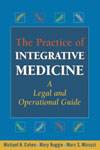 The Practice of Integrative Medicine: A Legal and Operational Guide is now available from Springer.
The Practice of Integrative Medicine: A Legal and Operational Guide is now available from Springer.
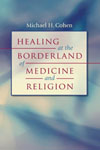 One of the transformations facing health care in the twenty-first century is the safe, effective, and appropriate integration of
One of the transformations facing health care in the twenty-first century is the safe, effective, and appropriate integration of
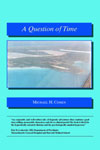 Michael H. Cohen's novel A Question of Time is about consciousness. Gabriel Goodman takes a vacation from his law firm
Michael H. Cohen's novel A Question of Time is about consciousness. Gabriel Goodman takes a vacation from his law firm
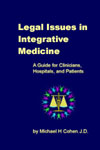 Legal Issues in Integrative Medicine: A Guide for Clinicians, Hosptials, and Patients by Michael H. Cohen (National Acupuncture Foundation,
Legal Issues in Integrative Medicine: A Guide for Clinicians, Hosptials, and Patients by Michael H. Cohen (National Acupuncture Foundation,
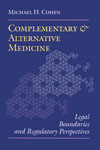 In Complementary and Alternative Medicine: Legal Boundaries and Regulatory Perspectives, Michael H. Cohen breaks new ground in putting together the
In Complementary and Alternative Medicine: Legal Boundaries and Regulatory Perspectives, Michael H. Cohen breaks new ground in putting together the
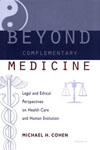 In Beyond Complementary Medicine, Michael H. Cohen goes deeper into the legal, ethical, and regulatory aspects of integrating complementary and
In Beyond Complementary Medicine, Michael H. Cohen goes deeper into the legal, ethical, and regulatory aspects of integrating complementary and
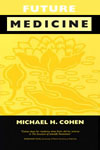 Future Medicine by Michael H. Cohen is an investigation into the clinical, legal, ethical, and regulatory changes occurring in our
Future Medicine by Michael H. Cohen is an investigation into the clinical, legal, ethical, and regulatory changes occurring in our
 What happens when a Wall Street lawyer, steeped in Judaism, enters an interfaith seminary, engages mystically, and connects with disincarnate
What happens when a Wall Street lawyer, steeped in Judaism, enters an interfaith seminary, engages mystically, and connects with disincarnate